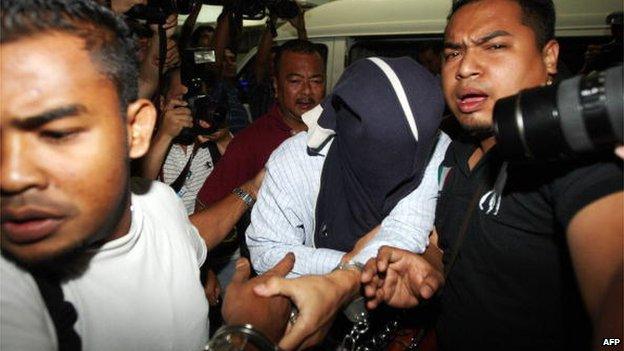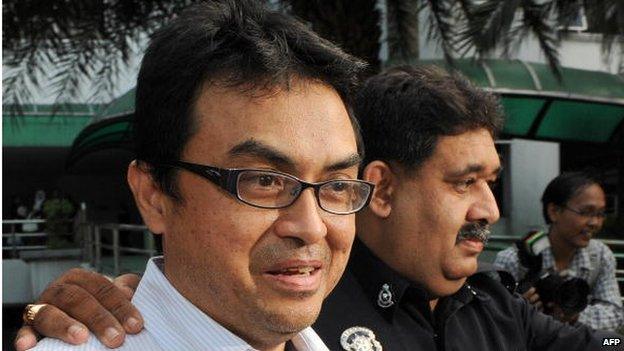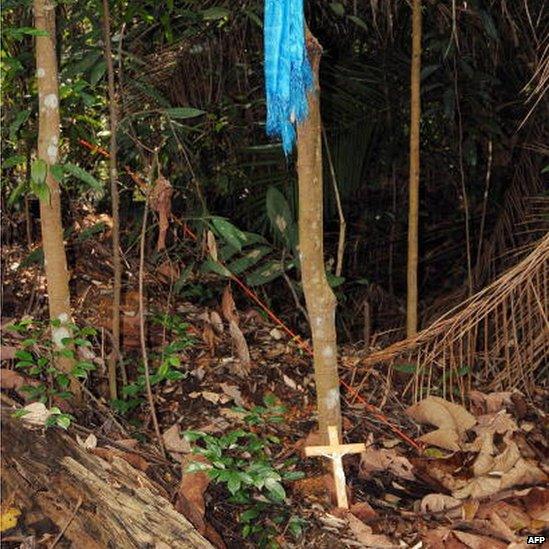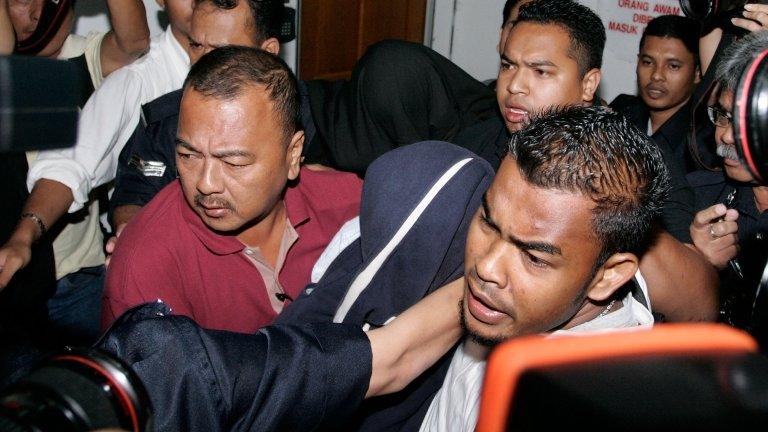Malaysia officers' Mongolia model death sentences upheld
- Published

The policemen, one of whom is seen here with his face covered in this 2009 photo, have been sentenced to death
Malaysia's highest court has upheld death sentences for two policemen convicted of murdering a Mongolian woman linked to senior politicians.
The remains of Altantuya Shaariibuu, a model and interpreter, were found in jungle in 2006. She had been shot in the head and blown up.
Police officers Azilah Hadri and Sirul Azhar Umar were acquitted in 2013.
But the Federal Court ruled in favour of prosecutors who appealed and reinstated the men's death sentences.
The case, which rocked the country when it first came to light, has for years been the subject of speculation about political conspiracies.
It has dogged Prime Minister Najib Razak - deputy prime minister at the time of the murder - who has been accused of interfering with the investigation.
The opposition has sought to link him to the case, but Mr Najib has repeatedly said that he had nothing to do with it and never met Ms Shaariibuu.
Abdul Razak Baginda, a former associate of Mr Najib, was also arrested for abetting the murder but charges against him were eventually dropped. He later admitted that he had an affair with Ms Shaariibuu.

Political analyst Abdul Razak Baginda was arrested but later cleared of his involvement in the case
The two policemen, who belonged to the elite Special Action Unit protecting top lawmakers including Mr Najib, deny the charges against them. They were arrested over Ms Shaariibuu's murder in 2006 and found guilty and sentenced to death in 2009.
They appealed against their conviction and were acquitted in 2013, with a lower court ruling at that time that gaps in evidence had been overlooked in their trial. No motive was ever determined for the killing.

Analysis: Jennifer Pak, Kuala Lumpur
The murder of Altantuya Shaariibuu is often whispered around Malaysian dinner tables as a cautionary tale to not cross the powerful political elite.
Some Malaysians jokingly tell me that they may be "blown up" like Ms Shaariibuu if they talk to me on camera about topics such as the country's new car policy or subsidy cutbacks. The fear of being seen as anti-government is widespread.
Campaign groups have alleged that Ms Shaariibuu was murdered to keep her quiet about purported kickbacks to high-level Malaysian officials. Prime Minister Najib Razak has previously denied any links to the case.
One of the convicted officers said in court that he was used as a scapegoat but did not say who was behind the murder.
In a country where the mainstream media is controlled by the governing coalition, Malaysians pay far more attention to what is not being said.


Ms Shaariibuu's remains were found in a jungle clearing in 2006
The panel of five judges ruled on Tuesday that the defence for the two policemen "had failed to cast reasonable doubt on the prosecution's case".
Defence lawyer Kamarul Hisham Kamaruddin said they would "respect that decision and be bound by that decision".
One of the officers, Sirul Azhar Umar, was not present in court on Tuesday for the verdict. His defence team told the court they did not know where he was, and a warrant for his arrest was issued.
- Published23 August 2013
